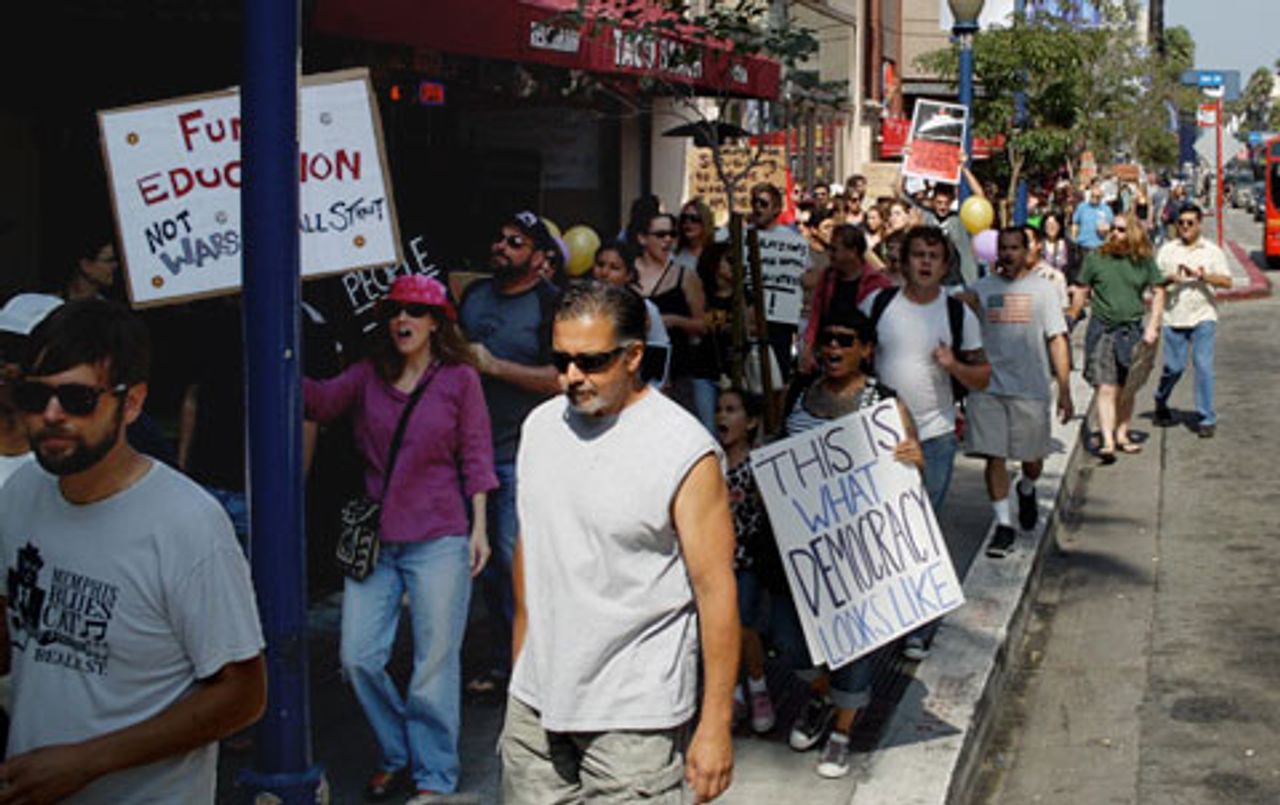 The march in Long Beach
The march in Long BeachLong Beach, southeast of Los Angeles with 460,000 inhabitants, is the site of the second largest port in the United States.
Several hundred students and workers marched through parts of downtown in solidarity with the global protests that day. Many of the protesters carried homemade signs calling for an end to the wars in Afghanistan and Iraq, demanding health care for all, supporting the funding of education, and denouncing the greed of Wall Street.
As the marchers assembled, several men made homeless by the jobs crisis approached, eventually joining the protest. Homeless men and women can be seen many days at Lincoln Park, making use of the Long Beach Main Library at one end of the park.
Socialist Equality Party supporters distributed and discussed with protesters the WSWS statement “The Way Forward in the Fight Against Wall Street.”
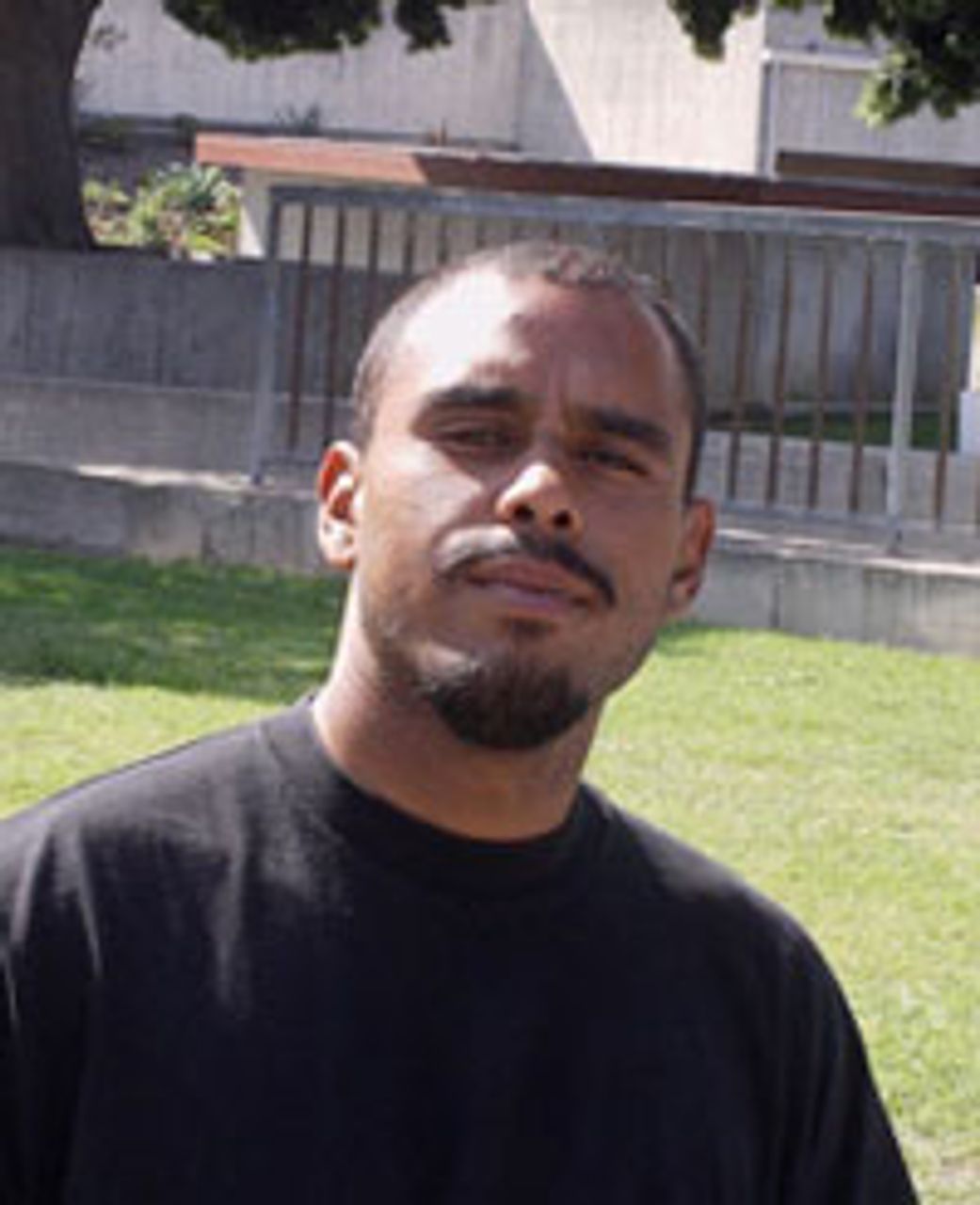 Michael James
Michael JamesMichael James, 27, is homeless and has lived on the streets of Long Beach since he was laid off from his restaurant job over a year ago. He said: “Before these protests began I used to think that the number of people in Wall Street, how busy the stock exchange is, showed how much work there is out there, that they were a sign of good economic times.
“Not anymore. I was working at Mel’s restaurant until about two years ago. Since then the only work that I get is handing out leaflets door to door. That kind of work is not enough to have a home or a good future.
“What I liked about the World Socialist Statement is that the working class citizens should all have a chance at prosperity in life. Our goals should be realizable. We should not have to struggle to struggle again. We should have a good retirement—the savings that one puts away for when they are 67 she still be there.
“I make use of the computers in the Long Beach Library and I would like to go to community college this next year.
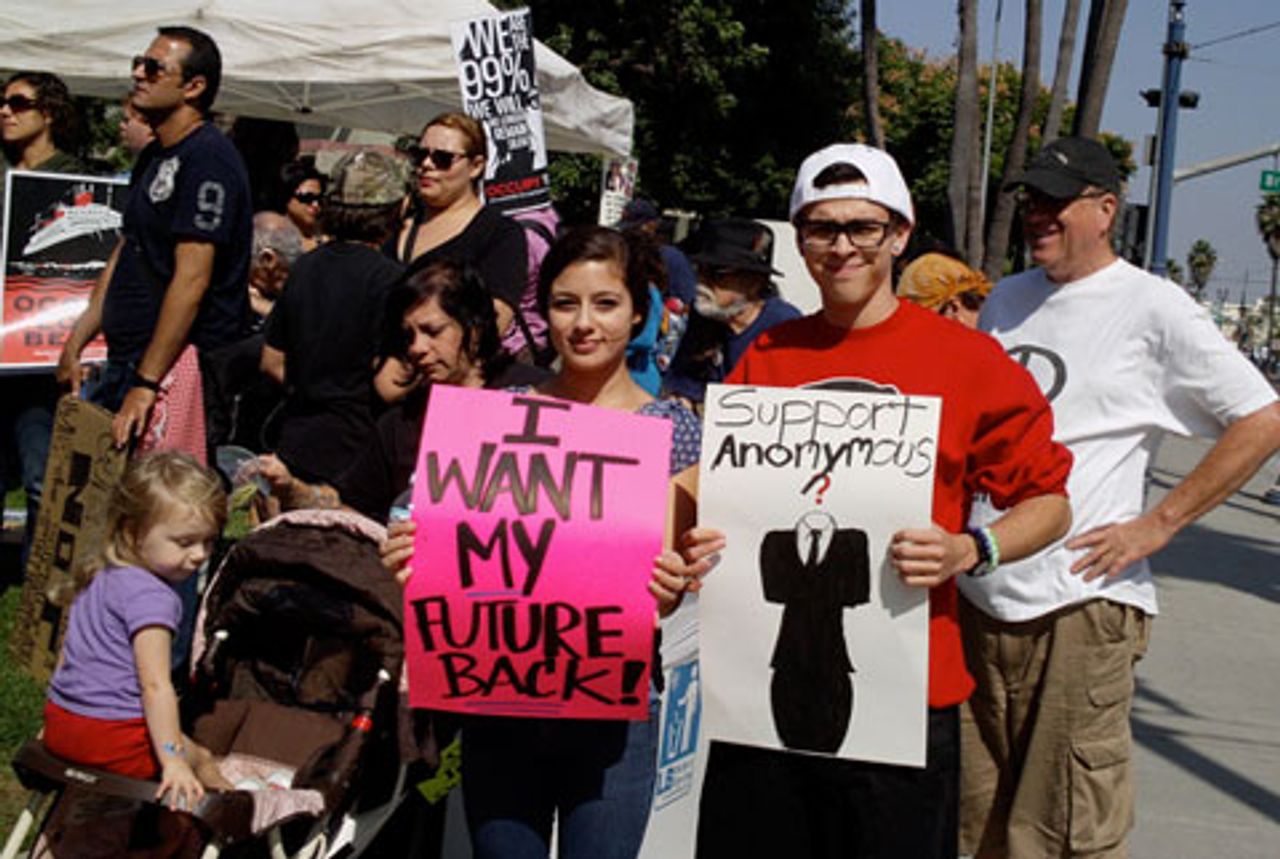 Melissa and Parker
Melissa and ParkerWSWS reporters discussed the statement with Melissa and Parker. Melissa said, “I am fifteen and in high school. I am angry that people are going to college and getting degrees and stuff; then going out hunting for jobs afterwards. What is the point of going to college and getting a degree in history and not being able to apply it because there are no jobs? So I am angry. That is why I am here.
Parker is studying film and photography at a local college. He told us, “I just got into college and I don’t see Barack Obama doing anything well for this country. More and more jobs are being lost. President Obama continues to say that he is going to work for people being given jobs and this isn’t seen.
“My dad owns his own business and I get scared sometimes thinking that he may lose his business, just because of the job losses going on around him and how bad things are. The deficit has not improved any. It is the second worse it has been since the Great Depression and Obama needs to do something. Since he is not, we are doing something about it.”
“We hope to raise awareness in our country,” Melissa added. “I hope that the Congress will do something.”
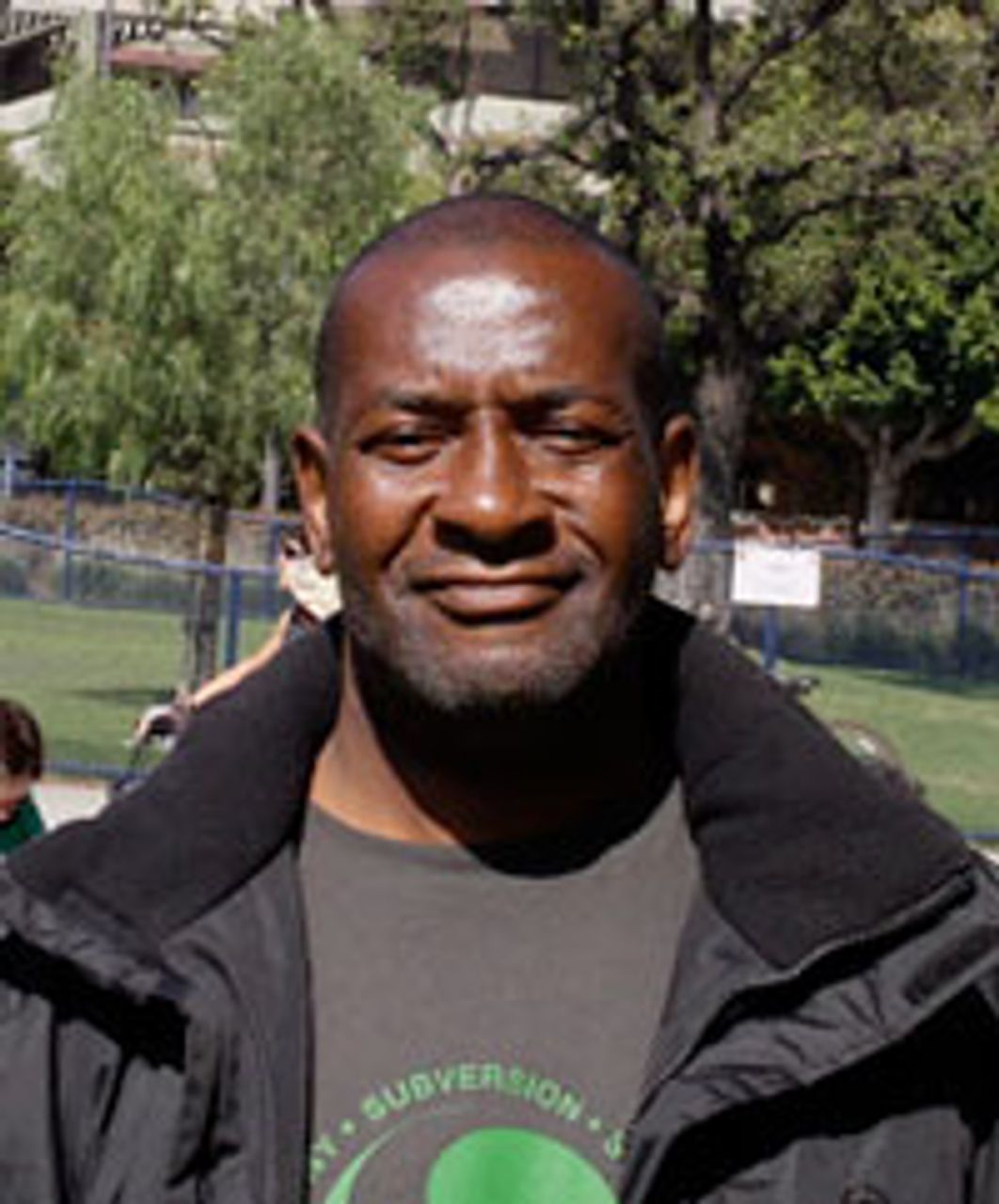 James Smith Jr.
James Smith Jr.James Smith Jr., 58, is part of that generation of workers displaced by the deindustrialization of Long Beach in the 1980s and 1990s. He recently lost his job as home attendant.
James said, “My job was taken from me by Governor Schwarzenegger when he prohibited people who had felony records to be a home attendant. According to the new rule, it did not matter what crime it had been, violent or nonviolent, or if one had already done their time. So I lost my job. My crime had been nonviolent and I don’t blame anyone for it.
“Before prison I had been an automotive technician for Goodyear. At the time Goodyear and Firestone had plants in Long Beach. Goodyear was only a few blocks from here. After they shut it down, the company that took it over fired all the senior techs that were making top dollar and replaced them with less well-paid workers. It has been an uphill struggle for me since then, and for a long time.
“I agree with your statement about workers’ rights, especially the one about high-quality public education. I was raised in LA and I graduated from Locke High School in 1971. All they did was pass me from one grade to another. The education they gave me was not a quality education. When I got to prison, I discovered that I could not pass any of the tests they gave me. So I enrolled in school. For 18 months all I did was go from my cell to the classroom and back, to make up for the education that had been denied me.
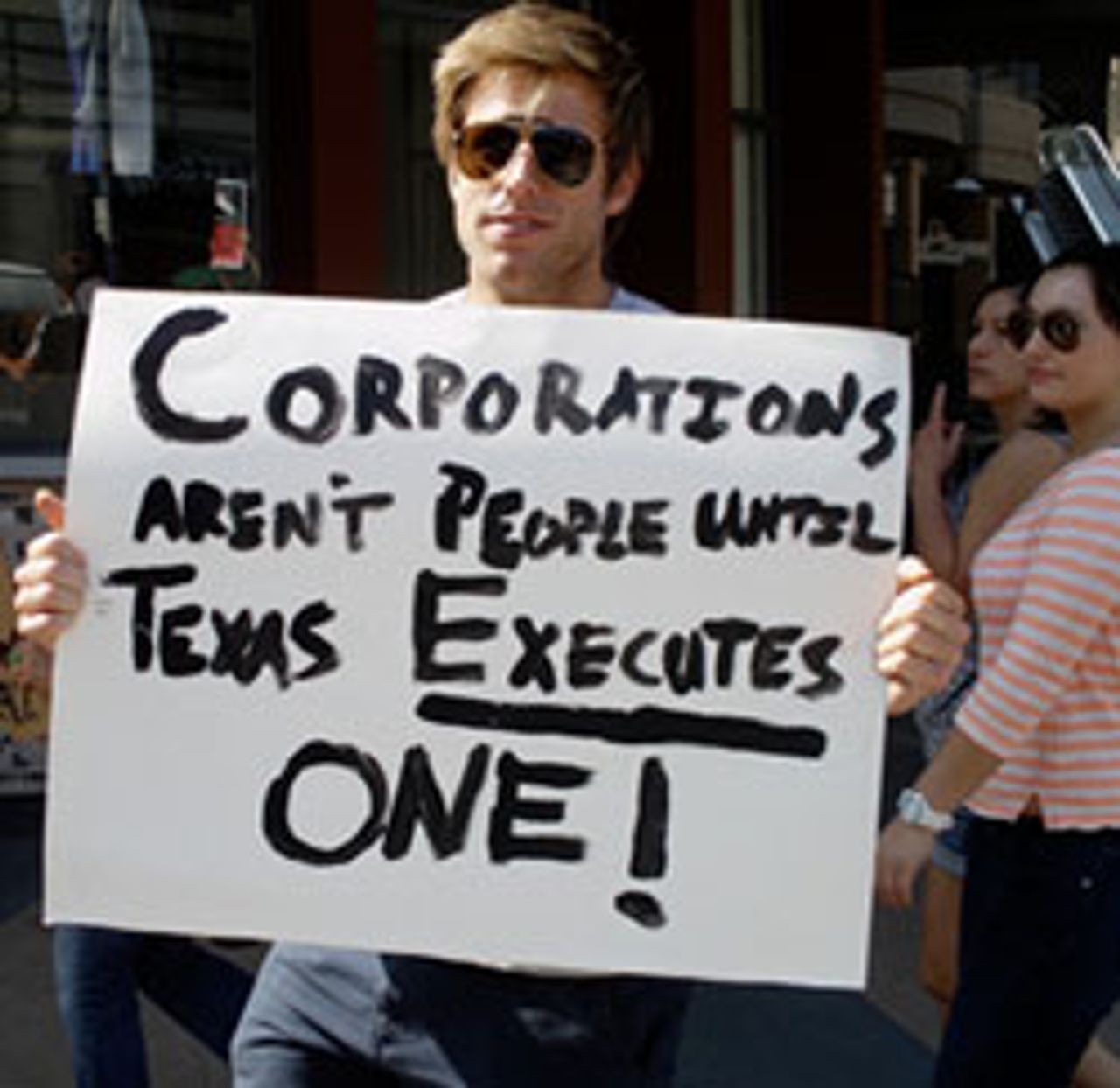 Protester behind sign
Protester behind sign“Here in the library they supposedly allow homeless to come in and use the computers and stuff, but they make them leave their belonging outside. There is always that ‘something else’ that creates a problem in life. A person may say, ‘I need to do this,’ but the price may be losing something else. In this case taking advantage of the right to use the library could mean spending a cold night outside.
“At 58 now I am too old to be hired for full-time work and too young to collect Social Security. So what I do is go to a temporary jobs agency, called ‘The Village,’ and try to get day labor. For them to send you out you have to show persistence, what used to be known as a ‘shape-up.’ You have to keep showing up on time and ready to work.”
Another worker, Alvin, works taking care of the disabled. He said, “I was riding my bicycle downtown and saw this protest and decided to get involved. I have been doing this same job since 1999 and it has never been this bad. The biggest issue for me is the price of housing. That is what caught my eye right away in the statement. It is not acceptable that housing is so out of reach.
“Even people that are working are forced to live with family members, or even be homeless. So many have jobs but they can’t afford a place to live. There is no rent control in Long Beach, you know. One month you are paying $500 a month, the next month it can go up to $600, $700, or $800—whatever the owner can get away with.
“Once I make my house payment and pay my house note, and food and utilities, there is no more money there, except for maybe 10 or 15 dollars. In Long Beach they have built luxury high rises and restored older buildings. They are all half vacant. The rents are extravagant; people cannot afford them. At the same time, you have many people living in the park.”
Along the route of the march, motorists honked and many onlookers applauded and voiced their support for the marchers. Shining bright spotlights on the demonstrators and with the roaring sound of generators, the police made it clear that there would be no sleeping in the park itself, but were vague about the prospects of sleeping on the sidewalk. Those who stayed Saturday had to set up their tents on the sidewalk.
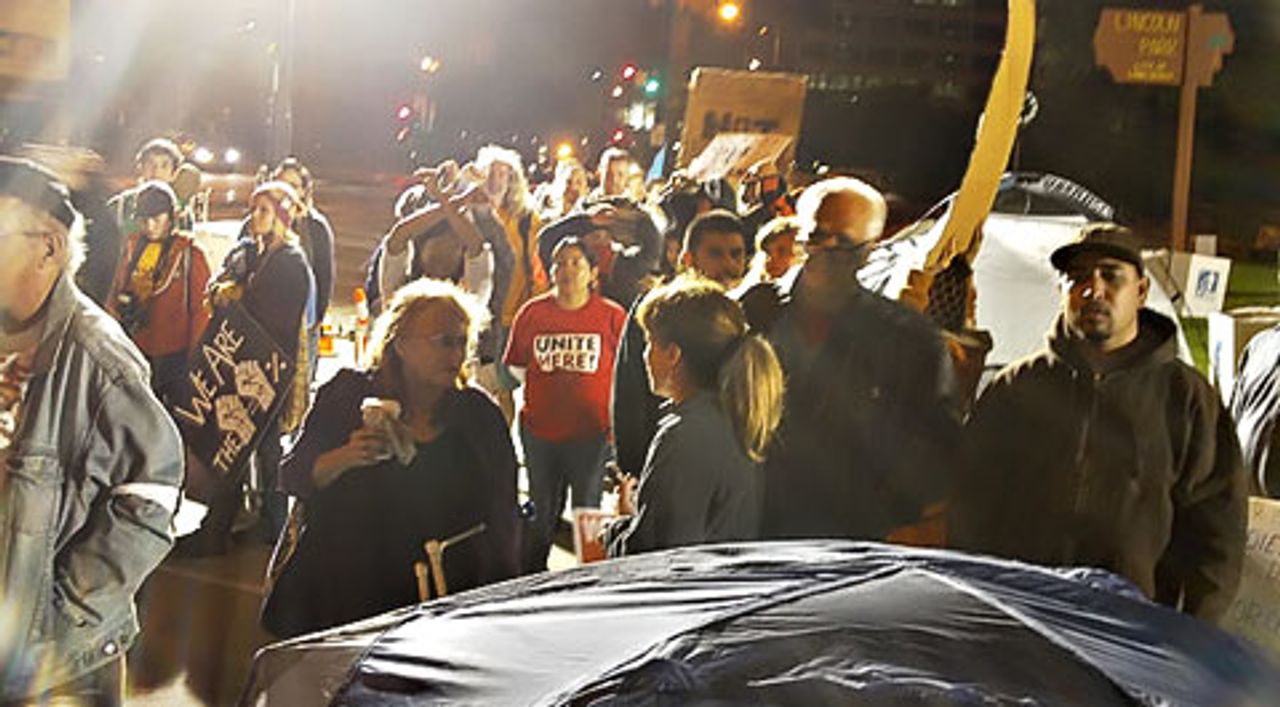 Lincoln Park on Sunday night
Lincoln Park on Sunday nightOn Sunday, October 16, some 140 Occupy Long Beach protesters attempted to set up tents and spend the night at Lincoln Park. A confrontation with the police then took place. Instead of mounting an outright assault, the police steadily escalated their harassment with powerful lights and noise.
Following the initial prohibition of tents, when the people got into their bags the cops told them they couldn’t sleep lying down. Next they told them that they couldn’t have covers on them. In other words they had to be exposed to the elements all night, under conditions where near the ocean it can get brisk and breezy. Police finally told the protesters that they couldn’t sleep—lying down, sitting, standing, uncovered, whatever—on the sidewalk.
An eyewitness later told the World Socialist Web Site that three people were arrested that night. OLB organizers are planning further protests this weekend.
